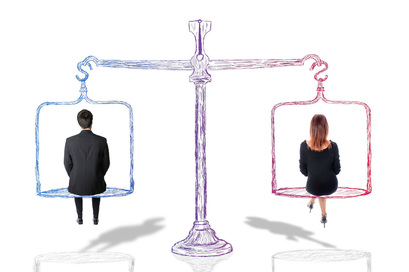The gender pay gap is generally based on the average difference between male and female’s gross hourly earnings, and recent studies have found that women in the EU earn on average 16.4% less per hour then men. Although the gender pay gap varies across Europe, there is still a 14.4% difference in male and female pay in Ireland, one that employers need to try and eradicate to ensure they are not in breach of the Equality Act 2010.
WHAT ARE THE MAIN CAUSES OF THE GENDER PAY GAP?
Discrimination in the Workplace
This occurs when males and females are not paid the same wages where they are contracted as having the same role in the workplace and therefore carry out the same work. This is often noted as ‘direct discrimination’ as it’s clear that women are treated less favourably than men. Another factor could be due to a prewritten policy or practice that result in unequal treatment between genders. Whichever the case, this type of discrimination is prohibited under EU law.
Different Jobs, Different Sectors
It’s a well-known fact that certain sectors employ, on average, more gender than the other. For example, in the healthcare sector, females make up 80% of all employees, whereas in the construction industry, most employees would be male. Sectors tend to have lesser salaries where more women are employed than those dominated by men.
Workplace Practices and Pay Systems
The term ‘glass ceiling’ is often used when discussing female limitations with reaching the highest paid positions, and this generally comes down to company practices and policies, whether it be through access to training or career development. There are also different approaches in rewarding employees, such as bonuses, allowances etc. which can affect pay between male and females in the workplace.
Women are Under-Represented in Politics and in the Economy
Within the EU, men make up two thirds of scientists and engineers, and even in sectors with a higher percentage of female workers, senior and top level positions are still under-represented by women. In a survey completed in 2013, women made up 17.8% of board members in public listed companies across the EU, however with the new gender quotas coming into play, there is expectation that this statistic will increase in the coming years.
Balancing Work and Family Responsibilities
When it comes to work/life balance, generally a woman will give up part of her working life to take care of family responsibilities, which in turn means job progression and the opportunity to receive higher pay is negatively affected. As a result, male partners tend to work longer hours and seek opportunities for higher paid jobs which further widen the gender pay gap.
WHAT ARE THE BENEFITS OF CLOSING THE GENDER PAY GAP?
Supplying Quality Jobs
In recent years, there has been an increase in women expecting more of a career/family life balance as well as females feeling they don’t need to forego a successful career to have a family, and vice versa. If companies wish to attract top talent, they need to consider both male and female candidates, irrespective of their domestic lives.
Good for Business, Workers and the Economy
Employers should use female employee skills by presenting policies on work/life balance and training and career development. Generally businesses that incorporate equality strategies into the workplace create a positive working environment, leading to improved productivity, employee satisfaction and loyalty.
Avoiding Litigation and Complaints
Companies who do not ensure equal pay for work of an equal value leave themselves open to potential discrimination claims being filed due to unfair work practices. An employee is entitled to equal pay on the following nine grounds: gender, civil status, family status, sexual orientation, religion, age, disability, race or being a member of the Traveller community.
An order for equal pay and up to three years arrears in pay could be ordered if a member of staff brings a pay discrimination claim before the Equality Tribunal, therefore if policies are in place from day one, time and money spent on dealing with complaints and subsequent litigation is prevented.
HOW DOES YOUR WORKPLACE MEASURE UP?
Employers should carry out an equal pay audit to ensure that gender discrimination in the workplace is eliminated and that they are not in breach of the Equality Act 2010.
- Are there more women than men in subordinate positions?
- Are there more men than women in managerial positions?
- If the company has a job evaluation scheme, is it more than five years old?
- Do men and women have equal access to bonus, overtime, pension other plus payments?
- Are part-time workers paid fairly when compared on an hourly basis?
Once an equal pay audit is carried out, it is imperative for employers to act on the results and ensure that any gender pay discrimination is eliminated, where appropriate, within the business, through updating company policies and strategies.
The contents of this article are necessarily expressed in broad terms and limited to general information rather than detailed analyses or legal advice. Specialist professional advice should always be obtained to address legal and other issues arising in specific contexts.


 RSS Feed
RSS Feed